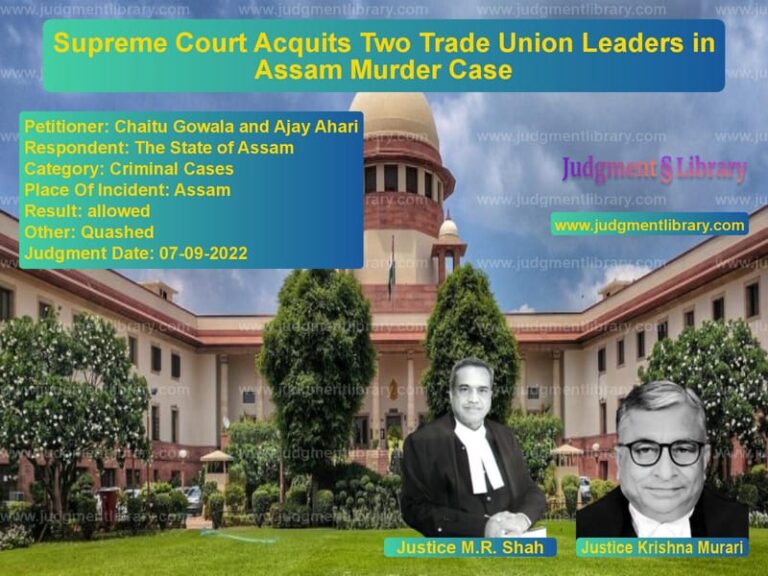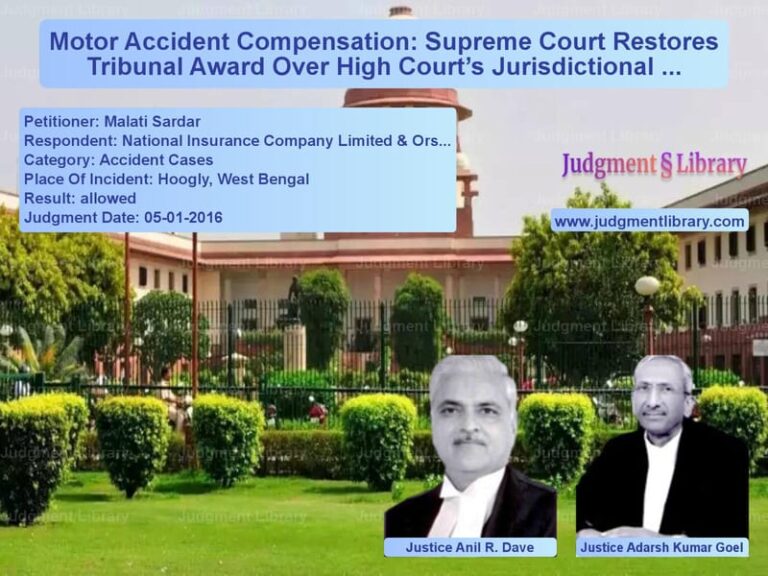Bias in Government Recruitment: Supreme Court Upholds Cancellation of Appointments in Madhya Pradesh
The Supreme Court of India, in its recent judgment in the case of Krishnadatt Awasthy & Others v. State of Madhya Pradesh & Others, has reiterated the principles of fairness and transparency in government recruitment. This case involved the selection of candidates for the post of Shiksha Karmi Grade-III, where allegations of nepotism and bias led to the cancellation of appointments. The Court analyzed whether the appointments were vitiated due to the presence of relatives of the selection committee members and whether the principles of natural justice were violated during the cancellation of these appointments.
Background of the Case
The case originates from the recruitment process for Shiksha Karmi Grade-III in Janpad Panchayat, Gaurihar, District Chhatarpur, Madhya Pradesh, in 1998. The appellants, including Krishnadatt Awasthy and others, were selected and appointed through a process overseen by a selection committee. However, a challenge was raised by an unsuccessful candidate, Archana Mishra, who alleged that several of the selected candidates were closely related to members of the selection committee. The Collector of Chhatarpur, upon reviewing the allegations, found merit in the claims and canceled the appointments of 14 candidates, including the 10 appellants.
The appellants challenged this decision before the Commissioner in a revision petition, which was dismissed. They then moved the High Court of Madhya Pradesh, where a learned Single Judge upheld the decision of the authorities, holding that the appointments were vitiated due to the doctrine of bias. The Division Bench of the High Court also affirmed this decision. Aggrieved, the appellants approached the Supreme Court.
Petitioners’ Arguments
The appellants contended that their appointments were based purely on merit and that their selection had followed due procedure. They argued that:
- The cancellation of their appointments was done without giving them an opportunity to be heard, violating the principle of audi alteram partem.
- They had no control over who was on the selection committee, and their familial relationships should not be a reason to invalidate their selection.
- The selection committee had passed a resolution stating that members related to candidates would recuse themselves during interviews, ensuring no undue advantage was given.
- There was no evidence to prove that they had received preferential treatment in the selection process.
Respondents’ Arguments
The State of Madhya Pradesh and the complainant, Archana Mishra, countered these claims, asserting that:
- The selection process was tainted as close relatives of the selection committee members were appointed, creating a reasonable likelihood of bias.
- Sections 40 and 100 of the Madhya Pradesh Panchayat Raj Act explicitly prohibit office bearers from using their position to benefit their relatives, and this principle was violated.
- The mere presence of bias was sufficient to vitiate the entire selection process, regardless of whether actual favoritism was proven.
- The affected candidates were given ample opportunity at the appellate and revisional stages to contest the decision.
Supreme Court’s Analysis and Observations
The Supreme Court, in its detailed judgment, examined the doctrine of bias and the principles of natural justice in administrative law. It referred to several landmark rulings, including:
- A.K. Kraipak v. Union of India: This case established that the principles of natural justice apply to administrative decisions and that even a mere likelihood of bias is sufficient to invalidate an administrative action.
- R v. Sussex Justices: The Court reiterated the principle that justice must not only be done but must also be seen to be done.
- State Bank of Patiala v. S.K. Sharma: This case emphasized that while procedural violations can be excused in some circumstances, substantive violations affecting fairness cannot be ignored.
The Court held that the selection process was vitiated due to the presence of bias. It found that:
- The selection committee members had appointed their own relatives, which was prohibited under the law.
- Even though they had recused themselves during interviews, their presence in the committee had a potential influence on the process.
- The cancellation of appointments did not violate natural justice, as the affected candidates were given opportunities to contest the decision before the Commissioner and the High Court.
Final Judgment
The Supreme Court dismissed the appeals, affirming the decision to cancel the appointments. The Court held:
“The presence of reasonable likelihood of bias is sufficient to vitiate the selection process. The principles of fairness and transparency must be upheld in government recruitment, and nepotism cannot be allowed to creep into the system.”
The Court also observed that allowing such appointments to stand would set a dangerous precedent, undermining public confidence in the fairness of government recruitment.
Implications of the Judgment
This ruling has significant implications for public sector recruitment in India. It reinforces the importance of fairness and transparency in hiring processes and ensures that:
- Relatives of selection committee members are not given undue advantage in recruitment.
- Appointments tainted by bias can be set aside even if no direct favoritism is proven.
- Government bodies must strictly adhere to the principles of natural justice and administrative fairness.
Conclusion
The Supreme Court’s decision in this case serves as a critical reminder that the integrity of public appointments must be maintained at all costs. The ruling upholds the core principles of administrative law, ensuring that recruitment processes remain free from bias and nepotism. This judgment will likely serve as a precedent in future cases involving similar issues, reinforcing the need for impartiality in government hiring practices.
Read also: https://judgmentlibrary.com/supreme-court-rules-on-pension-benefits-for-retired-high-court-judge/
Petitioner Name: Krishnadatt Awasthy & Others.Respondent Name: State of Madhya Pradesh & Others.Judgment By: Justice J.K. Maheshwari, Justice K.V. Viswanathan.Place Of Incident: Chhatarpur, Madhya Pradesh.Judgment Date: 04-04-2024.
Don’t miss out on the full details! Download the complete judgment in PDF format below and gain valuable insights instantly!
Download Judgment: krishnadatt-awasthy-vs-state-of-madhya-prad-supreme-court-of-india-judgment-dated-04-04-2024.pdf
Directly Download Judgment: Directly download this Judgment
See all petitions in Recruitment Policies
See all petitions in Public Sector Employees
See all petitions in Termination Cases
See all petitions in Employment Disputes
See all petitions in Workplace Harassment
See all petitions in Judgment by J.K. Maheshwari
See all petitions in Judgment by K.V. Viswanathan
See all petitions in dismissed
See all petitions in supreme court of India judgments April 2024
See all petitions in 2024 judgments
See all posts in Service Matters Category
See all allowed petitions in Service Matters Category
See all Dismissed petitions in Service Matters Category
See all partially allowed petitions in Service Matters Category







